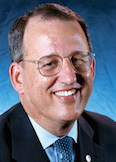Searching for a New Chancellor
Posted on Nov. 15, 2007Chancellor James Moeser’s announcement that he will step down June 30 as Carolina’s ninth chancellor has prompted many to speculate about what the Chancellor Search Committee will focus on in choosing finalists to recommend to the UNC Board of Trustees. The trustees must recommend no fewer than two finalists to UNC System President Erskine Bowles ’67, who will then nominate one person for approval by the UNC System Board of Governors. While each chancellor search is different, some factors have evolved during the searches in the past three decades that might suggest areas of likely emphasis.

Doug Dibbert ’70
The two most obvious factors relate to fundraising and the health of the chancellor. Chancellor N. Ferebee Taylor ’42 created the position of vice chancellor for development and public service and led Carolina’s first campuswide fundraising campaign — the Carolina Challenge. He reluctantly left the chancellorship for health reasons at the urging of his doctor and his family. Chancellor Christopher Fordham ’47 put in place much of the needed foundation for the Bicentennial Campaign, but with the then-mandatory retirement age of 65, he recognized that he would be unable to serve throughout the length of the campaign and retired before its official launch. Chancellor Paul Hardin served throughout the Bicentennial Observance and the Bicentennial Campaign and announced 18 months before the end of the campaign that he would retire at its conclusion.
Chancellor Michael Hooker ’69 was identifying the leadership and priorities for the Carolina First Campaign when he was diagnosed at 54 with cancer, which subsequently took his life. Chancellor Moeser will be “stepping down” six months after the conclusion of the Carolina First Campaign, which he,Vice Chancellor Matt Kupec ’80 and scores of UNC deans, campus development officers and volunteers have led to remarkable success. (Multi-year capital campaigns increasingly last seven or more years — longer than the average tenure of public university chief executive officers.)
As a parting gift to the University community that should guide the Chancellor’s Search Committee as well as our new chancellor, Chancellor Moeser identified the four greatest challenges that will face his successor:
- enrollment growth;
- intensifying competition for research support;
- identifying resources for new investments; and
- hiring 2,000 new faculty over the next eight years. (The Review plans a retrospective on Chancellor Moeser’s years in the May/June issue.)
Already many have readily volunteered their hope that a visionary leader — rooted in Carolina and experienced in the challenges of a complex public research university — will be chosen. Preserving and enhancing the generous public support that Carolina enjoys will require a sophisticated, ambitious public and government relations capacity for Carolina and is increasingly recognized as essential.
During a chancellor search nearly 20 years ago at Carolina, after an exhaustive review that included interviews with 138 alumni, legislators, editors, students, faculty, University administrators, trustees and others, the review team issued a 107-page report in which it identified qualities it then thought should be present in a new chancellor. The review committee suggested the new chancellor “be a person with sufficient psychological strength to make difficult decisions and to press for institutional change; be an effective internal and external spokesperson but also secure and facile enough to function in the larger system of higher education in North Carolina; have a record of strong interpersonal skills sufficient to pull together the institution’s various constituencies; be articulate in one-on-one and group discussions as well as before large audiences; be in good health and have the physical stamina to work long hours; be an effective manager as well as a leader; have a personal warmth and a sense of humor; meet the full test of a field of the very finest candidates possible.”
The Chancellor Search Committee — on which GAA Chair Dwight M.”Davy” Davidson ’77 is serving — has the challenge of determining which of the above identified qualities and others are most essential, for no candidate will possess all of the desired experience and qualities. In the final analysis, in identifying the finalists to recommend, the search committee and then the trustees must make a leap of faith knowing that Carolina’s 10th chancellor will expect and need the full support of each of us.
In the coming weeks, as it did in each of the past two chancellor searches, the GAA’s Tar Heel Network, led by Chair Tom Lambeth ’57, will hold a series of meetings at which alumni will be invited to suggest what should be the priorities of our new chancellor. Meanwhile, we hope you will share your thoughts, concerns or suggestions with us. You may send your comments to: Chancellor Search Committee, c/o General Alumni Association, The University of North Carolina, George Watts Hill Alumni Center, P.O. Box 660, Chapel Hill, N.C. 27514-0660.
Of course, you may always e-mail your comments to me.
Yours at Carolina,

Douglas S. Dibbert ’70
